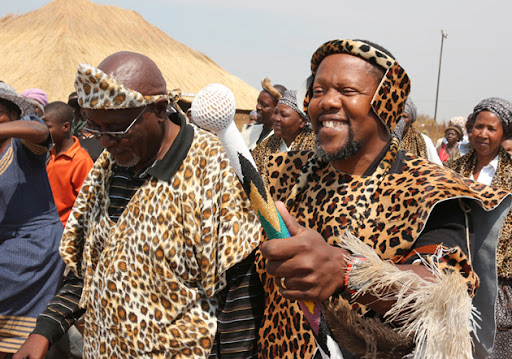CLAIM: With all authority vested in me, I have got the right and privilege to seize your property.
SOURCE: Chief Maduna
VERDICT: False
In a video clip circulating on social media, a man believed to be Chief Vezi Maduna of Insiza District in Matabeleland South, claims that as a chief he has powers to seize property of parents who fail to clear their debts, including school fees, with schools. He asks school heads and School Development Committees to compile a list of what parents owe to schools and hand them over to concerned parents through his court messengers, with a deadline to clear on the 15th (month not mentioned). He says after the 15th, he will then use his powers as a chief to seize the parents’ property, which includes livestock, in order to recover what local schools are owed by parents.
“I as a chief, with all authority vested upon me, I have got the right and privilege to seize your property,” he says, in the video clip. “I have every right to come to your kraal and take cattle…. if they want 10 goats, they will take 10 goats….My father was tough but he was lenient. I am lenient, but I am tough and rough…I am very rough because I will be using the law,” he says in the video clip.
The video clip has generated debate on social media with some users on platforms such as X, formerly Twitter, questioning if a chief has powers to do what Maduna is threatening to do, here and here.
The conduct and role of traditional leaders is primarily enshrined in 3 pieces of legislation; the Constitution, Traditional Leaders Act and the Customary Law and Local Courts Act.
The judicial power and the conduct of the chief’s court – community court – is enshrined in the latter.
Section 16 of the Customary Law and Local Courts Act states that:
16 Limits of jurisdiction of local courts
(1) A local court shall have no jurisdiction in any case— (a) where the claim is not determinable by customary law;
Chief Maduna in the video clip is offering his court as an arbitrator between schools – which does not fall under customary law – and parents, as some kind of debt collector. This, according to the law, falls outside his court’s jurisdiction.
A contract between schools and parents on the payment of fees does not fall under customary law.
Precedence
The Zimbabwean law allows for villagers whose cases have been handled by chiefs to appeal to higher courts if they are aggrieved. The lowest court is the primary court, presided over by a village head. This is followed by the community court, presided over by the chief; then the magistrate’s court, the High Court and the Supreme Court, in that order.
This means that chiefs do not operate outside the parameters of the justice system.
In January 2024, Chief Nyoka of Chikomba district was ordered by the Chivhu Civil Court to return a teacher’s property that had been seized as a fine. The teacher had appealed to the court after Chief Nyoka had convicted and fined her for spraying a poisonous pesticide around her house, resulting in the death of her neighbour’s chickens. After failing to pay the fine, Chief Nyoka seized her refrigerator and other household items.
In 2012, the High Court overturned Chief Negomo’s conviction of the late former Prime Minister Morgan Tsvangirayi. Chief Negomo, Licius Chitsinde, had fined Tsvangirai two beasts, a sheep and a piece of white cloth for paying a bride price for Leocardia Karimastenga Tembo in November, a sacred month according to Shona culture.
In 2019, then Ntabazinduna Chief, Nhlanhla Ndiweni, was convicted and sentenced to 18 months over a case that he had tried at his community court. In 2014, Ndiweni had ordered a villager, Fetti Mbele, to evict his wife from his homestead. When he didn’t, Ndiweni and 23 other villagers destroyed Mbele’s property in a bid to evict him. Ndiweni was later released on bail, left for the United Kingdom, and currently has a warrant of arrest issued against him.

According to Section 282 of the Constitution of Zimbabwe, traditional leaders, who include chiefs have the following functions:
282 Functions of traditional leaders
(1) Traditional leaders have the following functions within their areas of jurisdiction—
(a) to promote and uphold the cultural values of their communities and, in particular, to
promote sound family values;
(b) to take measures to preserve the culture, traditions, history and heritage of their
communities, including sacred shrines;
(c) to facilitate development;
(d) in accordance with an Act of Parliament, to administer Communal Land and to protect
the environment;
(e) to resolve disputes amongst people in their communities in accordance with customary
law; and
(f) to exercise any other functions conferred or imposed on them by an Act of Parliament.
(2) Except as provided in an Act of Parliament, traditional leaders have authority,
jurisdiction and control over the Communal Land or other areas for which they have been
appointed, and over persons within those Communal Lands or areas.
(3) In the performance of their functions, traditional leaders are not subject to the direction
or control of any person or authority, except as may be prescribed in an Act of Parliament.
(4) An Act of Parliament must provide for the regulation of the conduct of traditional
leaders.
Conclusion
The claim by Chief Vezi Maduna that he has authority vested in him to seize property belonging to villagers to pay off debt owed to schools is false. The jurisdiction of the community court does not extend to being a debt collector for government institutions. The jurisdiction of chiefs in settling civil disputes is only limited to the application of customary law.











